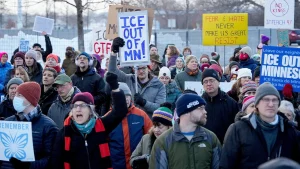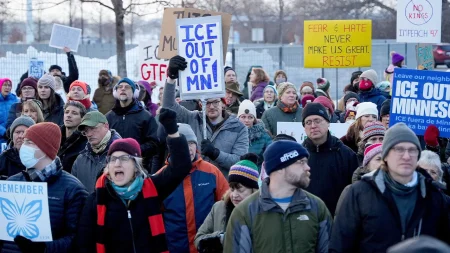The Perilous Journey: How Desperate Palestinians Found Their Way to South Africa
Shadowy Network Facilitates Migration Wave That Caught Officials Off Guard
In the early morning hours at O.R. Tambo International Airport in Johannesburg, immigration officials were bewildered as groups of Palestinian families began arriving with minimal documentation and no clear plans for their stay in South Africa. This unprecedented influx has revealed the existence of a clandestine network of intermediaries who, for substantial fees, promise safe passage to Palestinians desperate to escape the deteriorating humanitarian conditions in Gaza. What makes this situation particularly troubling is that many of these migrants had no idea South Africa would be their final destination until they landed on the tarmac—a revelation that has caught both the migrants and South African authorities completely unprepared.
“I sold everything I owned to get my family out,” explained Mahmoud Khalil, a former accountant from Gaza City who arrived three weeks ago with his wife and two children. “The man who arranged our travel only told us we were going to a safe country where we could build a new life. It wasn’t until we were given our boarding passes for the final flight that we learned we were heading to Johannesburg.” Khalil’s experience mirrors that of dozens of other Palestinian families who have been arriving in South Africa since February, paying between $5,000 and $10,000 per person for what smugglers describe as a “complete migration package.” These transactions, conducted through a web of middlemen stretching from Gaza through Egypt and various transit countries, exemplify the desperation of people willing to entrust their lives and limited resources to organizations operating in the shadows of international migration.
South African Authorities Scramble to Respond to Unexpected Migration Crisis
The South African Department of Home Affairs has found itself in an unenviable position, attempting to balance humanitarian obligations with border security concerns. “This situation was not on our radar,” admitted Deputy Minister of Home Affairs Njabulo Nzuza during an emergency parliamentary briefing. “We’re dealing with individuals who have arrived through legal ports of entry but under circumstances that suggest organized human smuggling.” The government has established a task force to investigate how these travel arrangements circumvented normal immigration protocols, particularly the requirement for Palestinians to obtain visas before arriving in South Africa. Officials are particularly concerned about the potential exploitation of South Africa’s asylum system, which is already strained by applications from other conflict regions.
The investigation has revealed troubling patterns in how these journeys are orchestrated. Many Palestinians report a similar process: after initial contact with local “travel facilitators” in Gaza or refugee camps in neighboring countries, they are passed through a chain of handlers across multiple countries. Documents materialize at different transit points, with instructions often coming via encrypted messaging applications. By design, the migrants know very little about who is actually organizing their journey. “This fragmented approach makes it extremely difficult to identify and dismantle the entire network,” explained Colonel Athlenda Mathe, spokesperson for the South African Police Service’s Organized Crime Unit. “The individuals we interact with in South Africa are often just the final links in a sophisticated international chain.”
Historical Ties and Political Complications Underscore Migration Challenge
South Africa’s long-standing support for the Palestinian cause adds layers of complexity to the current situation. Since the days of Nelson Mandela, who famously declared, “Our freedom is incomplete without the freedom of the Palestinians,” South Africa has maintained strong diplomatic solidarity with Palestine. The country has been among the most vocal critics of Israeli policies and recently brought a genocide case against Israel at the International Court of Justice. This political stance has created an awkward dilemma as authorities now grapple with the practical challenges of unexpected Palestinian migration.
“There’s a profound tension between our country’s principled support for Palestinian rights and the practical realities of managing migration,” observed Professor Amanda Gouws, a political scientist at Stellenbosch University who specializes in human rights and migration. “South Africa’s unemployment rate exceeds 30%, and our social services are already stretched beyond capacity. Even with the best intentions, integrating these families presents significant challenges.” The government’s response is being closely watched by various stakeholders—from human rights organizations advocating for generous asylum policies to local communities concerned about competition for scarce resources. Meanwhile, diplomatic considerations loom large, as any perceived mistreatment of Palestinians could undermine South Africa’s moral standing on the international stage.
Families Face Uncertain Future After Arduous Journeys
For the Palestinian families who have arrived, the initial relief of escaping conflict has given way to the harsh realities of life in an unfamiliar country where they have no connections, limited resources, and often face language barriers. Most have been temporarily housed in modest accommodations on the outskirts of major cities, reliant on assistance from overstretched non-governmental organizations and the Palestinian diaspora community in South Africa. The unexpected nature of their arrival means many lack even the most basic preparation for life in their new country.
“We were told everything would be arranged—housing, work permits, school enrollment for our children,” said Fatima Bakri, who arrived with her three children two months ago. “But once we landed, the person who was supposed to meet us never appeared.” Bakri’s family spent their first three nights sleeping in the airport before being assisted by a local Islamic charity. Stories like hers highlight the vulnerability of refugees who have been misled about the conditions awaiting them. While some families have been welcomed by South Africa’s established Palestinian community, which dates back several decades, resources are limited. Community leaders report being overwhelmed by requests for assistance with everything from translation services to emergency housing and medical care. Despite these challenges, many new arrivals express determination to build new lives. “We cannot go back,” explained one father of four who asked not to be identified. “Whatever difficulties we face here, they cannot compare to what we left behind.”
International Response and Lessons for Migration Management
The situation in South Africa has drawn attention from international organizations monitoring global migration trends. The United Nations High Commissioner for Refugees has offered technical assistance to South African authorities, while emphasizing that the situation highlights broader failures in providing safe, legal migration pathways for people fleeing conflict zones. “When legitimate routes to safety are closed off, people don’t simply stop moving—they take more dangerous paths and become vulnerable to exploitation,” noted UNHCR regional representative Leonard Zulu during a press conference in Pretoria last week.
Migration experts point to this case as emblematic of how contemporary human smuggling networks operate—adapting quickly to changing border policies and exploiting gaps in international coordination. “What we’re seeing in South Africa is happening worldwide, just with different routes and destinations,” explained Dr. Jessica Lawrence, Director of the Global Migration Institute. “Smuggling networks identify countries with specific vulnerabilities in their immigration systems and direct migrants there until those loopholes close, then they pivot elsewhere.” For South African authorities, the immediate priority remains identifying and assisting the Palestinian families who have arrived while developing more effective screening mechanisms at ports of entry. But the broader challenge—addressing the root causes that make people desperate enough to place their fates in the hands of smugglers—remains as intractable as ever. As one immigration official acknowledged off the record, “As long as people are fleeing for their lives, they’ll find a way to move. The question is whether that movement happens in a way that preserves human dignity and security, or one that further endangers already vulnerable people.”









